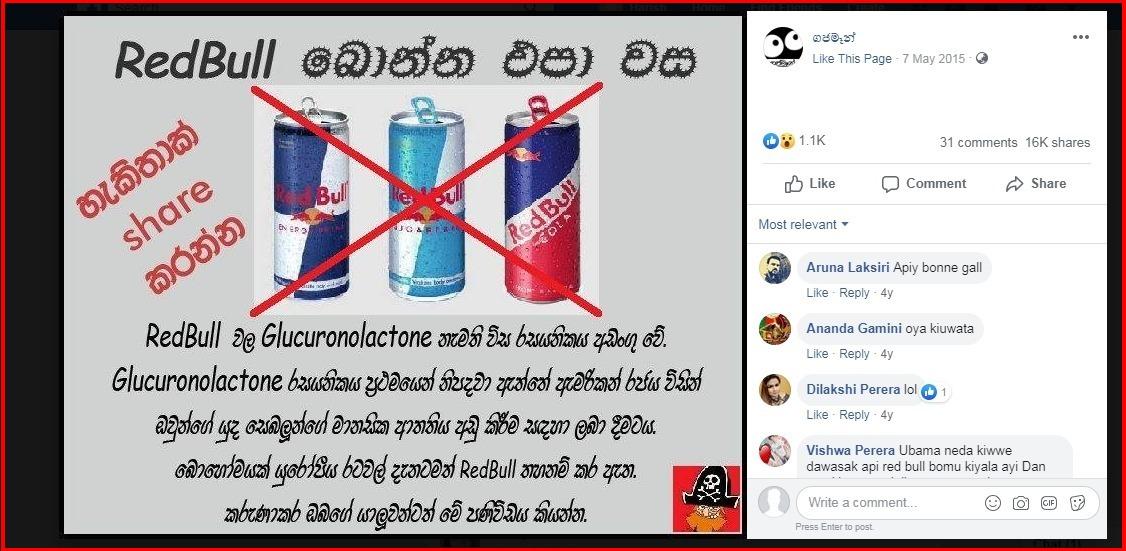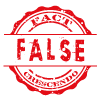
Claim on Social Media

| Archived Link |
The above post is being circulated on Facebook since last four years and to this date, it has been shared more than 12000 times and is still being shared. The post does not contain any description but an image with a text claim in Sinhalese. In addition, cans of all the three Red Bull products, which are Red Bull (Dark blue and white can), Red Bull Sugarless (Light blue and white can) and Red Bull Cola (Dark blue, white and red can) which have a cross on them. The text in Sinhalese translates as follows:
Redbull: Don’t drink poison
Share As Much as You Can
Redbull contains a toxic chemical called Glucuronolactone
Glucuronolactone chemical was initially developed by the US government to relieve the stress levels of their soldiers
Most of the European countries have already banned the chemical
Please share this message with your friends!
Red Bull is one of the most popular drinks in the world and the post claims that drinking Red Bull can prove dangerous to health. The post supports the claim by arguing that most of the European countries have already banned Glucuronolactone, which the post allegedly claims to be a toxic chemical developed by the US government to relieve stress levels of its soldiers. The post advices that since Red Bull contains this ‘toxic chemical’ Glucuronolactone and hence one should avoid drinking Red Bull. So, is drinking Red Bull dangerous to your health? Is Glucuronolactone a toxic chemical, which was developed by the US government for its soldiers? We will find out the answers to these questions by investigating the claim and finding out the facts.
Fact Check Methodology
We researched online and studied about Glucuronolactone in order to verify whether it is a synthetically developed chemical compound or a naturally occurring one. Wikipedia defines Glucuronolactone as follows:
Glucuronolactone is a naturally occurring substance that is an important structural component of nearly all connective tissues.
Wikipedia has cited the Merck Index as reference for this definition. Merck Index is an encyclopedia of chemicals drugs and biologicals with over 10,000 monographs on single substances or groups of related compounds published online by the Royal Society of Chemistry. Therefore, it is evident that Glucuronolactone is a naturally occurring substance contrary to the claim that it is a synthetically developed chemical compound to alleviate stress.
The post also claims that most of the European countries have banned Red Bull. When we searched about countries that have banned Red Bull. We found out that at present only three countries have a ban on Red Bull. These three countries are Norway, Uruguay and Denmark. Prior to 2008, France had also banned the sale of Red Bull due to health hazards posed by it. As per a Reuters article, France had banned Red Bull primarily because of concerns regarding an ingredient called Taurine. However, the French government was forced to lift the ban due to European Union regulations which state that a product made or sold in other EU countries cannot be banned unless a health risk is proven. However, even before the ban was lifted by France, a less caffeine and less taurine variant of Red Bull was being sold.
Renowned fact checking website, Snopes had also Fact Checked the same claim and had published a detailed report on their website in which they have explained the origins of this claim. The claim surfaced on the internet way back in the year 2000. Claims were made such as The British Medical Journal had published an article regarding growing number of cases reported by Doctors and Surgeons involving the very same side effects from the 70’s. However, the article did not turn up when searched on The British Medical Journal. Similarly, claims such as Taurine is derived from Bull’s semen were also made in some hoax messages. After conducting a thorough research Snopes have concluded that the message is fake and the allegations made are absolutely baseless. Red Bull contains Glucuronolactone, Taurine and Caffeine, but Glucuronolactone is a naturally occurring carbohydrate and is apparently innocuous. Taurine used in Red Bull is synthetically produced and the caffeine content in Red Bull drink is equal to the caffeine content in a cup of coffee. The rumors linking deaths to consumption of Red Bull. However, it has not been proven that Red Bull caused these deaths.
Conclusion
Red Bull is not dangerous to health owing to the following facts:
- Glucuronolactone is a naturally occurring carbohydrate on contrary to the claim that it is a toxic chemical compound developed by the US to relieve stress of its soldiers.
- The claim that most of the European countries have banned Red Bull is also false as only Norway and Denmark have banned Red Bull.
References:
| Snopes | Archived Link |
| Medical news today | Archived Link |
| Reuters | Archived Link |
| Nexus news feed | Archived Link |
| Glucuronolactone Wikipedia | Archived Link |

Title:Fact Check: Is Glucuronolactone a toxic chemical that makes Red Bull drink unfit for consumption…?
Fact Check By: HarishResult: False






